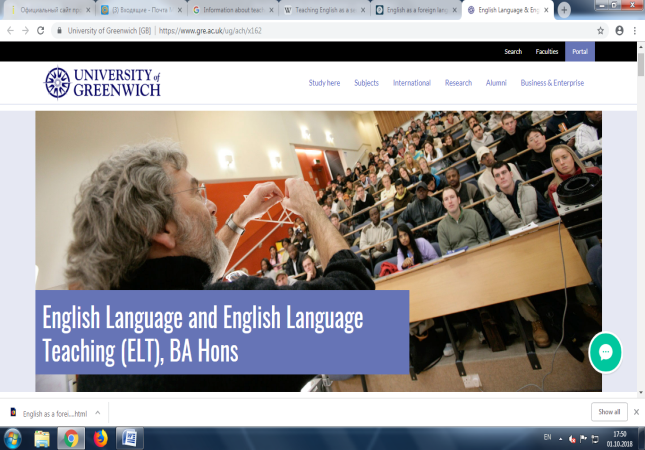English as a foreign language teacher
As an English as a foreign language (EFL) teacher, you'll teach English to adults and children whose first or main language is not English.
You'll use a range of course books and materials, plus a variety of audio-visual aids, to encourage students to communicate with each other using the structures and vocabulary they've learnt and to improve the four basic language skills of listening, speaking, reading and writing. A strong emphasis is placed on dialogue and role-playing, but more formal exercises language games and literature are also used.You can work in a variety of settings, including commercial language schools, schools and institutions of further and higher education throughout the UK and overseas. You can also teach in industry or become self-employed. Classes are usually taught in English, even with beginners. Types of English as a foreign language teacher 
Common terms used for English as a foreign language teaching are:
Teaching English as a foreign language (TEFL) - traditionally used for teaching English to people who want to learn English for work or leisure reasons. TEFL can be done in the UK or abroad and usually involves short-term study.
Teaching English as a second language (TESL) - more commonly used for people who live in an English-speaking country, but who don't speak English as a first language. These students may be refugees or immigrants, and need to learn the language in order to help them settle into society.
Teaching English to speakers of other languages (TESOL) - an umbrella term that commonly incorporates both TEFL and TESL (and variations such as ESOL and ESL).
As an English as a foreign language teacher, you'll need to:
plan, prepare and deliver lessons to a range of classes and age groups
prepare and set tests, examination papers and exercises
mark and provide appropriate feedback on oral and written work
devise, write and produce new materials, including audio and visual resources
organise and get involved in social and cultural activities such as sports competitions, school parties, dinners and excursions
attend and contribute to training sessions
participate in marketing events for the language school
prepare information for inspection visits and other quality assurance exercises
undertake administrative tasks, such as keeping student registers and attendance records.
You'll need to have:
excellent spoken and written communication skills
effective listening skills
creative skills and ideas for planning practical and interesting lessons
excellent planning and organisation skills
a friendly and confident manner
the ability to work well under pressure
a flexible approach to work
cultural sensitivity, tolerance and patience.
If you want to stay in the career and progress you'll need to take further qualifications, typically at diploma level. The most common are:
Delta (Diploma in Teaching English to Speakers of Other Languages), offered by Cambridge Assessment English
DipTESOL (Diploma in Teaching English to Speakers of Other Languages), offered by Trinity College London.
The Distance DELTA is offered through International House London and the British Council and is validated by Cambridge Assessment English.
You can also go on to study for an MA in subjects, such as teaching English as a foreign language or applied linguistics, or take a Postgraduate Certificate in Education (PGCE).
Professional bodies such as NATECLA (National Association for Teaching English and other Community Languages to Adults) and NALDIC (National Association for Language Development in the Curriculum) produce newsletters and journals and run conferences and events, all of which can help with continuing professional development.
Higher-level qualifications, combined with relevant experience, can lead to senior positions in schools in both the UK and abroad, such as subject leader or director of studies. However, most UK schools are quite small, so opportunities for career progression and promotion may be limited. As more foreign students choose to study in the UK, the number of language teaching opportunities in colleges and universities also increases. These positions can offer greater stability and better pay, although competition is fierce. You'll typically need QTLS status or further Masters courses or PhDs for these roles.Promotion to managerial roles usually involves additional responsibilities, such as course development, administration, marketing and promotion, and less direct involvement with learners. There's scope for experienced teachers to go freelance, both in the UK and abroad, and to combine some of the following activities:
teaching part time in a school, college or university
giving private tuition on a one-to-one basis
writing course books and other material
teacher training and delivery and marking of examinations
training in business English
academic and general management
marketing and publishing.

 Получите свидетельство
Получите свидетельство Вход
Вход












 English as a foreign language teacher (404.25 KB)
English as a foreign language teacher (404.25 KB)
 0
0 91
91 0
0 Нравится
0
Нравится
0


